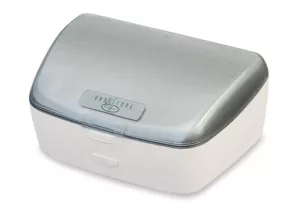Winter Care For Hearing Aids: How Can You Protect Them?
As winter approaches, it’s essential to remember that the cold weather affects not only us but also our hearing aids. Winter care for hearing aids ensures they continue to work perfectly all season long. While we prepare our homes for warmth, treat our boots for extra protection, and prepare our wardrobes for snow and freezing temperatures, we must not forget our hearing devices. They represent a significant investment in our health and require appropriate care to function their best.
Protecting your hearing aids from the cold is vital for their performance and longevity. Extreme temperatures can harm these sensitive instruments. We’ll share essential tips for safeguarding your hearing aids against the cold. By following these suggestions, you’ll avoid damage and maintain the quality of sound that your devices provide. Let’s ensure our hearing aids receive the care they need this winter, keeping them in tip-top condition.
Condensation Complications: Moisture and Hearing Aids
Winter brings unique challenges for hearing aids, primarily due to increased moisture from snow, rain, and condensation. Tackling moisture is a critical aspect of winter care for hearing aids to prevent damage and ensure they function optimally.
The Impact of Moisture on Hearing Aids
Moisture can severely affect hearing aids in several ways. It can corrode internal circuits, leading to malfunctions that compromise sound quality and device performance. Additionally, moisture can short-circuit sensitive components, causing irreversible damage. It also creates an environment conducive to bacterial and mold growth, irritating the ear canal and producing unpleasant odors.
Performance Degradation Due to Moisture
Moisture exposure can significantly degrade the performance of hearing aids. It can obstruct microphones, impair speaker functionality, and lead to increased feedback, all of which reduce sound clarity. Winter moisture can enter hearing aids through condensation, direct contact with snow or rain, and even sweat, affecting both behind-the-ear models and the battery compartment.
Keeping Hearing Aids Dry
Maintaining dry hearing aids is paramount. Moisture indicators include distorted sound, static noise, fading audio, and batteries depleting faster than usual. Protective measures such as using an umbrella and drying your hearing aids nightly can prevent moisture accumulation. It’s important to air out the devices by opening the battery doors when not in use and to consider using a dehumidifier for persistent moisture issues.
Effective Moisture Management Strategies
For comprehensive winter care, it’s advisable to clean your hearing aids daily with a dry cloth to remove any moisture. Investing in a dehumidifier or drying kit for hearing aids can help keep them dry overnight. Hearing aid sweatbands or earmuff covers provide additional protection against moisture during outdoor activities. Regular maintenance appointments are crucial for addressing any moisture-related complications promptly.
By implementing these strategies, you can ensure your hearing aids remain protected from moisture throughout the winter, maintaining their performance and extending their lifespan.
Temperature Troubles: Hearing Aids in the Cold
The cold season brings unique challenges for hearing aid users, but with the right winter care for hearing aids, you can navigate these obstacles smoothly.
Protecting Your Hearing Aids from the Cold
Cold temperatures can reduce battery life and affect the performance of your hearing aids. Here’s how to keep them safe and functioning well:
- Transition Wisely: When moving from cold to warm environments, let your hearing aids adjust gradually. Remove them and store them in a protective case to avoid condensation.
- Keep Them Warm: Don’t leave hearing aids in cold places like a car or outdoor pocket. Keep them in a case close to your body for warmth.
- Invest in Cold Weather Protection: For winter activities, a protective case designed for cold weather can shield your hearing aids from extreme temperatures.
How Cold Weather Impacts Hearing Aids
- Battery Life: Expect batteries to drain faster in cold weather. Switching to rechargeable batteries or carrying spares can help.
- Moisture and Condensation: Moving between temperatures can cause condensation, risking damage and bacterial growth.
- Stiff Components: Cold can stiffen tubing and earmolds, compromising comfort and fit.
- Performance: Sound quality and functionality may decline in extreme cold.

Tips for Optimal Winter Performance
- Store Smartly: Use a cool, dry place for storage, and avoid pockets or humid areas.
- Use a Dehumidifier: Dehumidifiers can remove moisture without harming your hearing aids.
- Ventilate: Open the battery compartment nightly to let any trapped moisture escape.
- Prevent Condensation: Let your hearing aids warm up slowly indoors and wipe away moisture.
- Be Prepared with Batteries: Carry spare batteries and replace them more frequently.
- Choose Suitable Accessories: Opt for headwear that doesn’t interfere with your hearing aids, like loose hats or ear warmers.
- Schedule a Winter Check-Up: Have your hearing aids cleaned and checked before winter to ensure they’re ready for the season.
- Communicate: Let others know how the cold may affect your hearing and stress the need for clear communication.
Additional Winter Care Tips
- Leverage Technology: A hearing aid care app can help manage maintenance routines.
- Secure Your Hearing Aids: Accessories like ear hooks can keep them secure in windy conditions.
- Experiment: Find what works best for your hearing aids and lifestyle during the winter.
By adopting these practices, you can ensure your hearing aids withstand the cold season, keeping your hearing health in top condition.
Learn more about the top hearing aid accessories.
Managing Winter Accessories with Hearing Aids
Wearing hats and earmuffs during winter can challenge hearing aid users, but with the right approach, you can stay warm without compromising your hearing aid’s performance.

Hats and Hearing Aids: A Comfortable Fit
- Choose Soft Materials: Select hats made from natural fibers like wool or fleece for comfort and to minimize feedback. Avoid tight hats that could dislodge your hearing aids.
- Adjust for Comfort: Wear your hat tilted back or adjust ear flaps to avoid pressing on your hearing aids, ensuring they stay in place.
- Explore Alternatives: Headbands, ear warmers, or scarves can offer warmth without interfering with your hearing aids.
Earmuff Essentials for Hearing Aid Users
- Select Over-the-Head Styles: These are less likely to disrupt your hearing aids than behind-the-head models.
- Adjustable for a Perfect Fit: Look for earmuffs with adjustable bands to avoid pressure on your hearing aids.
- Placement Matters: Wear earmuffs slightly off your hearing aids to reduce interference, and consider newer designs for better compatibility.
Accessorize Wisely
- Secure Your Investment: Consider ear hooks or clips to keep your hearing aids secure under winter accessories.
- Carry a Cleaning Kit: Always be ready to clean your hearing aids if they encounter moisture from snow or condensation.
Adopting these strategies allows you to enjoy the winter season without worrying about your hearing aids.
Hearing Care Providers Can Help
As we wrap up our guide on winter care for hearing aids, remember that the chilly season can intensify existing hearing challenges. Staying ahead is essential to ensure your hearing aids are in perfect working order. Regular maintenance appointments are key to catching any potential issues early, ensuring your devices continue to provide optimal performance.
Schedule Your Visit Today
Don’t let winter’s cold dampen the effectiveness of your hearing aids. We encourage you to schedule a maintenance appointment at your local American Hearing + Audiology center. Our team of experts is ready to provide the specialized care your hearing aids need to function their best during the winter months.
Ensuring your hearing aids are well-maintained prolongs their life and supports your overall hearing health. By taking the proper steps for winter care for hearing aids, you’re investing in your quality of life and staying connected to the sounds that matter most. Visit us today to ensure your hearing aids are winter-ready.




